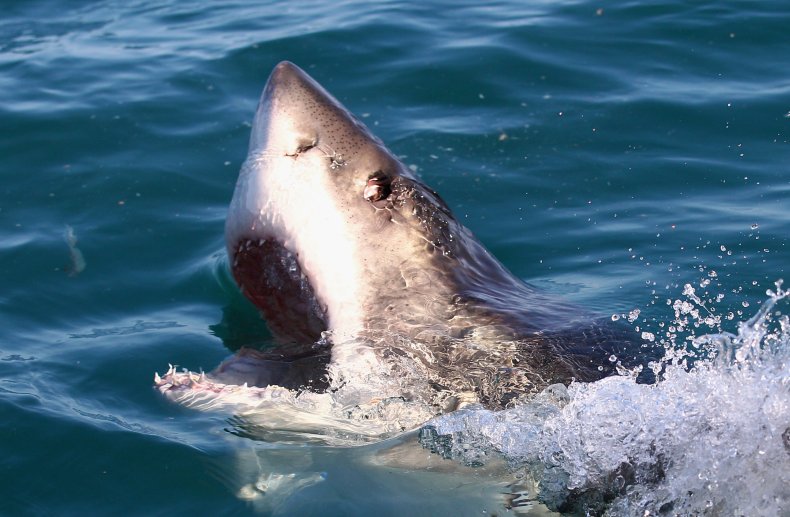BY ROSIE MCCALL NEWSWEEK 3/13/20
A pair of white sharks have been spotted attacking and killing a live humpback in Mossel Bay, South Africa, in what is believed to be a world first.
While there are several accounts of great whites (Carcharodon carcharias) scavenging on whale carcasses, this—say scientists writing in Marine and Freshwater Research—is the first documented observation we have of the apex predators preying on a living humpback (Megaptera novaeangliae).
The attack was witnessed on February 17, 2017, by crew aboard the Oceans Research Institute's research vessel, following a tip-off about a humpback whale entangled in discarded fishing gear. On inspection, they found a 23ft cetacean in poor health. Not only had it been caught in rope, but it was scrawny, covered in barnacles and crawling with whale lice.
Half an hour or so after the crew arrived, the first of two white sharks was seen approaching the whale. It started to circle the humpback before attacking the whale's left flank from behind.
It immediately let go, the study's authors wrote, and continued to circle the whale. It then did not bite again for 42 minutes, by which time the whale had lost a large amount of blood and slowed down. Again, the shark bit from behind and released its grip straight away, when the second and larger of the two sharks approached and took the third bite. The study's authors note that the presence of a bigger shark (13 feet) appeared to send the first shark packing.
An hour or so into the encounter, the second shark attacked again. This time targeting the head with an open gape—it "bumped" the rostrum (or beak) of the humpback. The whale made several attempts to dive into the water, as the shark continued to circle. The shark bit the whale's tail for a final time, more aggressively than each of the previous attempts, the researchers say. At this point, the whale sank. The entire attack lasted 90 minutes or so.
Atlantic white sharks like these are thought to regularly feast on whale carcasses or carrion and may even base their migrations on whale meat supply, some studies suggest. They have also been known to attack smaller cetacean species, such as the harbor porpoise and bottlenose dolphin. But while other species of shark, such as dusky sharks, have been known to prey on live humpback whales, this is the first example of white sharks doing the same.
"We acknowledge that this was a singular event, a consequence of the whale being entangled and in poor condition," the researchers write.
"Therefore, the event should not reflect all white shark attacks on live baleen whales. Nevertheless, this paper presents observations on a rarely observed interaction between white sharks and live whales."

While there are several accounts of great whites (Carcharodon carcharias) scavenging on whale carcasses, this—say scientists writing in Marine and Freshwater Research—is the first documented observation we have of the apex predators preying on a living humpback (Megaptera novaeangliae).
The attack was witnessed on February 17, 2017, by crew aboard the Oceans Research Institute's research vessel, following a tip-off about a humpback whale entangled in discarded fishing gear. On inspection, they found a 23ft cetacean in poor health. Not only had it been caught in rope, but it was scrawny, covered in barnacles and crawling with whale lice.
Half an hour or so after the crew arrived, the first of two white sharks was seen approaching the whale. It started to circle the humpback before attacking the whale's left flank from behind.
It immediately let go, the study's authors wrote, and continued to circle the whale. It then did not bite again for 42 minutes, by which time the whale had lost a large amount of blood and slowed down. Again, the shark bit from behind and released its grip straight away, when the second and larger of the two sharks approached and took the third bite. The study's authors note that the presence of a bigger shark (13 feet) appeared to send the first shark packing.
An hour or so into the encounter, the second shark attacked again. This time targeting the head with an open gape—it "bumped" the rostrum (or beak) of the humpback. The whale made several attempts to dive into the water, as the shark continued to circle. The shark bit the whale's tail for a final time, more aggressively than each of the previous attempts, the researchers say. At this point, the whale sank. The entire attack lasted 90 minutes or so.
Atlantic white sharks like these are thought to regularly feast on whale carcasses or carrion and may even base their migrations on whale meat supply, some studies suggest. They have also been known to attack smaller cetacean species, such as the harbor porpoise and bottlenose dolphin. But while other species of shark, such as dusky sharks, have been known to prey on live humpback whales, this is the first example of white sharks doing the same.
"We acknowledge that this was a singular event, a consequence of the whale being entangled and in poor condition," the researchers write.
"Therefore, the event should not reflect all white shark attacks on live baleen whales. Nevertheless, this paper presents observations on a rarely observed interaction between white sharks and live whales."

A Great White Shark swims in Shark Alley near Dyer Island on July 8, 2010 in Gansbaai, South Africa. Scientists describe two white sharks attacking a live humpback whale in a world first.RYAN PIERSE/GETTY
No comments:
Post a Comment